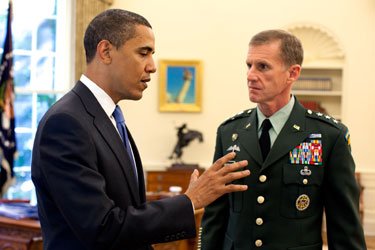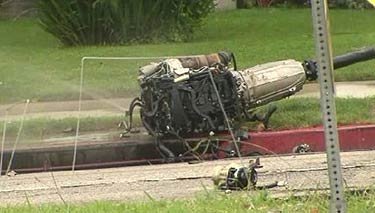Category Archive 'Stanley McChrystal'
03 Nov 2015

Reputedly told in McChrystal’s memoir: My Share of the Task:
When former U.S. Military commander in Afghanistan, Stanley McChrystal, was called into the Oval Office by Barack Obama, he knew things weren’t going to go well when the President accused him of not supporting him in his political role as President.
“It’s not my job to support you as a politician, Mr. President, it’s my job to support you as Commander-in-Chief,†McChrystal replied, and he handed Obama his resignation.
Not satisfied with accepting McChrystal’s resignation the President made a cheap parting shot. “I bet when I die you’ll be happy to pee on my grave.â€
The General saluted. “Mr. President, I always told myself after leaving the Army I’d never stand in line again.
20 Jun 2013


Slightly used motor and transmission of C250 Mercedes Benz
Jack Baruth, at The Truth About Cars, seemed just as broken-hearted as I am, but is just a trifle more tastefully discreet at concealing his feelings.
The writing-about-writing crowd is abuzz with discussion about the rather unusual death of Buzzfeed/RollingStone/Gawker writer Michael Hastings. Mr. Hastings, whose name is never mentioned in the press without the immediate mention that he was “the fearless journalist whose reporting brought down the career of General Stanley McChrystalâ€, died in a single-car accident in Los Angeles yesterday morning. This in and of itself is not unusual, but the circumstances of the crash and its aftermath won’t do anything to quiet the conspiracy theorists who are already claiming that the military-industrial complex found a way to cap the guy. …
Mercedes-Benz USA is no doubt sweating bullets over this one. An eyewitness report says that Mr. Hastings was driving at an excessive rate of speed down a suburban street when his car “suddenly jackknifed†and hit a tree “with the force of a bombâ€. The Benzo, which by the wheels and quarter-panel appears to be the relatively prosaic but cheerfully stylish C250 four-cylinder turbo coupe, proceeded to throw its powertrain out of the engine bay, immediately catch fire in a manner typically reserved for episodes of “Miami Viceâ€, and burn its driver until said driver was charred beyond recognition. …
Mr. Hastings’ aggressively Democrat-friendly storytelling has the Internet already considering the idea that his death was engineered somehow. I can’t say it’s totally unlikely. As noted above, the reported (and videotaped) behavior of the C250 was not in line with what we’d expect. On the other hand, surely it’s expected that a respected, mature writer on non-automotive topics won’t be barreling through a suburb so fast that any tree he hits will cause his car to burst into flames, right? We’ll keep an eye on this to see what, if anything, develops.
——————————-
Michael Yon adds:
Michael Hastings was killed in a car crash in Los Angeles. The single car accident happened at about 0425. He crashed into a tree and was burned beyond recognition. He was 33.
Mr. Hastings was the war correspondent whose Rolling Stone article led to the firing of General Stanley McChrystal, who at the time was the top General in Afghanistan.
Although Hastings was widely read, no serious war correspondents took him seriously, or at least not the ones I know. … Hastings was like an undisciplined hitman with a pen and license to kill. One of his gonzo articles damaged the career and reputation of Lieutenant General Bill Caldwell, for no cause. My sense was that he picked fights with key people mostly to draw attention. Though Hastings was not respected among war correspondents, it is sad to see a man die so young so horribly. Just why he crashed into a tree at 0425 remains unknown. No doubt the conspiracies will begin to fly.
New Joke: What do you call a metrosexual Rolling Stone attack dog journalist’s explosive collision with an LA palm tree? A good start.
25 Jun 2010

David Brooks writes General Stanley McChrystal’s epitaph.
Who could possibly imagine that a military commander’s staff had unkind things to say about members of the president’s staff?
Rolling Stone sold a lot of copies, reporter Michael Hastings made a big splash, and General McChrystal had his career ruined, it was all just a day’s work for the news business.
Most people in government, I find, are there because they sincerely want to do good. But they’re also exhausted and frustrated much of the time. And at these moments they can’t help letting you know that things would be much better if only there weren’t so many morons all around.
So every few weeks I find myself on the receiving end of little burst of off-the-record trash talk. Senators privately moan about other senators. Administration officials gripe about other administration officials. People in the White House complain about the idiots in Congress, and the idiots in Congress complain about the idiots in the White House — especially if they’re in the same party. Washington floats on a river of aspersion.
The system is basically set up to maximize kvetching. Government is filled with superconfident, highly competitive people who are grouped into small bands. These bands usually have one queen bee at the center — a president, senator, cabinet secretary or general — and a squad of advisers all around. These bands are perpetually jostling, elbowing and shoving each other to get control over policy.
Amid all this friction, the members of each band develop their own private language. These people often spend 16 hours a day together, and they bond by moaning and about the idiots on the outside.
It feels good to vent in this way. You demonstrate your own importance by showing your buddies that you are un-awed by the majority leader, the vice president or some other big name. You get to take a break from the formal pressures of the job by playing the blasphemous bad-boy rebel over a beer at night.
Military people are especially prone to these sorts of outbursts. In public, they pay lavish deference to civilian masters who issue orders from the comfort of home. Among themselves, they blow off steam, sometimes in the crudest possible terms. …
McChrystal, like everyone else, kvetched. And having apparently missed the last 50 years of cultural history, he did so on the record, in front of a reporter. And this reporter, being a product of the culture of exposure, made the kvetching the center of his magazine profile.
By putting the kvetching in the magazine, the reporter essentially took run-of-the-mill complaining and turned it into a direct challenge to presidential authority. He took a successful general and made it impossible for President Obama to retain him.
The reticent ethos had its flaws. But the exposure ethos, with its relentless emphasis on destroying privacy and exposing impurities, has chased good people from public life, undermined public faith in institutions and elevated the trivial over the important.
Another scalp is on the wall. Government officials will erect even higher walls between themselves and the outside world. The honest and freewheeling will continue to flee public life, and the cautious and calculating will remain.
The culture of exposure has triumphed, with results for all to see.
23 Jun 2010


“If I had my choice I would kill every reporter in the world but I am sure we would be getting reports from hell before breakfast.â€
–General William Tecumseh Sherman
————————————
We take all kind of pills, that give us all kind of thrills
But the thrill we’ve never known,
Is the thrill that’ll getcha
When you get your picture on the cover of the Rolling Stone.
Rolling Stone,
Wanna see my picture on the cover,
Wanna buy five copies for my mother,
Wanna see my smiling face
On the cover of the Rolling Stone.
— Dr. Hook And The Medicine Show
2:54 video
General Stanley McChrystal must now wish that he had listened to General Sherman and not Dr. Hook, and never agreed to give access to his command team or be interviewed by reporter Michael Hastings for Rolling Stone.
As Hastings unsympathetically explained to Newsweek, McChrystal should have understood that his interests and career meant nothing to the reporter he admitted into his inner counsels. If somebody cracked a joke or made an unkind remark about a rival government official or a superior, however embarrassing or damaging it might be, a reporter would consider it his own good luck and publish it with delight.
I was walking around with a tape recorder and a notepad in my hand three-quarters of the time. I didn’t have the Matt Drudge press hat on, but everything short of that it was pretty obvious I was a reporter writing a profile of the general for Rolling Stone. It was always very clear.
Career-ending Rolling Stone article
————————————
The unfortunate General McChrystal was flown back to Washington to apologize to Barack Obama and to tender his resignation. The predictions are that it will be accepted.

05 Oct 2009

Andrew Malcolm, at the LA Times, detects signs that the Obama Administration preparing to cut and run from Afghanistan.
(A)s memories of 9/11 and the attackers’ training sites in Taliban Afghanistan fade, polls show American support for the war there melting, especially within Obama’s own party.
Only about a quarter support sending more troops — and many of that party of Yes are Republicans. They agree with Obama that it’s essential to deny Afghanistan to terrorists and keep Pakistan’s nukes out of their hands.
So what to do?
White House officials say privately no final decisions will be made today. But the thinking will be greatly shaped and the stakes are huge, making healthcare look like a sideshow.
Signs are growing that Obama will seek to change the war goals, to redefine what is success and divert the discussion away from the more-troops measure. It’s not defeat in Afghanistan; it’s victory of a different kind. The president used a similar strategic argument recently when abandoning the Bush administration’s missile defense shield in Europe: it’s not less defense, it’s defense done smarter and cheaper.
————————————-
The Telegraph‘s account of anger over General McChrystal’s speech supports the Malcolm thesis.
According to sources close to the administration, Gen McChrystal shocked and angered presidential advisers with the bluntness of a speech given in London last week.
The next day he was summoned to an awkward 25-minute face-to-face meeting on board Air Force One on the tarmac in Copenhagen, where the president had arrived to tout Chicago’s unsuccessful Olympic bid.
Gen James Jones, the national security adviser, yesterday did little to allay the impression the meeting had been awkward.
Asked if the president had told the general to tone down his remarks, he told CBS: “I wasn’t there so I can’t answer that question. But it was an opportunity for them to get to know each other a little.
Your are browsing
the Archives of Never Yet Melted in the 'Stanley McChrystal' Category.
/div>

Feeds
|







